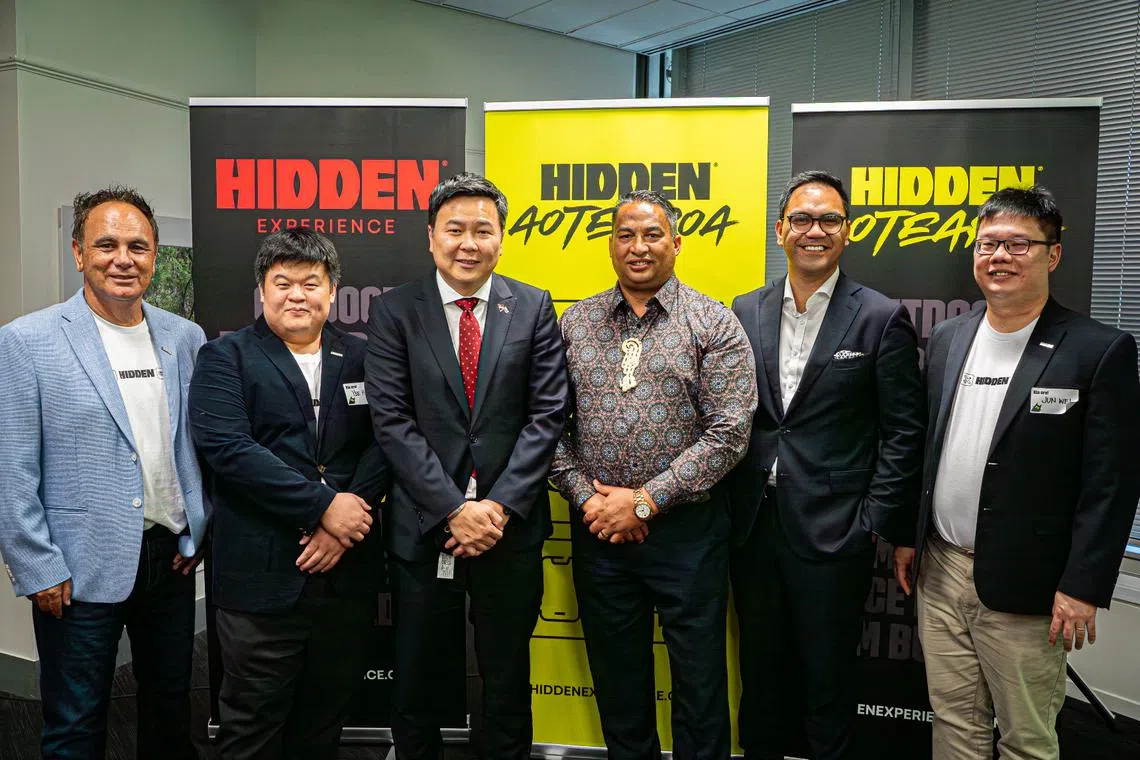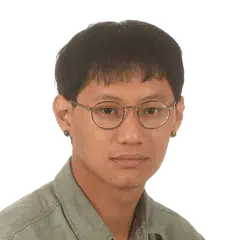S’pore firm launches New Zealand-based adventure game in tie-up with Maori tribe
Sign up now: Get ST's newsletters delivered to your inbox

(From left) Hidden Aotearoa CEO Andrew Te Whaiti, Hidden Group CEO Lim Yee Hung, Singapore High Commissioner to New Zealand William Tan, Ngati Kahungunu ki Tamaki-nui-a-Rua chair Hayden Hape, Te Papa Foundation chairman Aaron Hape and Hidden Group COO Loh Jun Wei at the launch event.
PHOTO: HIDDEN GROUP
Follow topic:
SINGAPORE – A Singapore-developed game has landed in the Land of the Long White Cloud, promising to unlock overlooked stories of New Zealand’s indigenous Maori people.
The WhatsApp app-based game – Hidden Aotearoa – is a tie-up between Singaporean tech and social enterprise Hidden Singapore and Ngati Kahungunu ki Tamaki-nui-a-Rua, which represents one of New Zealand’s largest Maori tribes. Aotearoa is the Maori name for New Zealand and means “land of the long white cloud”.
The game is a self-guided adventure where players make their way through various locations led by a digital cat called Piata (“shiny eyes” in Maori), solving puzzles and exploring indigenous Maori history – as well as that of New Zealand’s other ethnic groups – along the way.
In doing so they will uncover stories about New Zealand’s peoples and places in a more accessible – and perhaps more lasting – way, Ngati Kahungunu ki Tamaki-nui-a-Rua’s chairman Hayden Hape told The Straits Times in an interview before the game’s launch.
The game was officially launched at an event on Nov 29 at Te Papa, the national museum of New Zealand in its capital Wellington, and attended by the members of the tribes affiliated with the authority, as well as the game’s co-founders, Mr Lim Yee Hung and Mr Loh Jun Wei, staff and guests.
Singapore’s High Commissioner to New Zealand William Tan said in a speech at the event that the tie-up is a perfect blend of heritage and innovation.
He said: “I see this partnership as more than a business enterprise... It symbolises what can be achieved when we bring together the richness of cultural heritage and the strategies of the technology business.”
The game will eventually be available across the country. It currently has six experiences on the way, located in Wellington, Dunedin and Dannevirke, the first of which will launch in February 2025, the company said.
It did not confirm the exact content players can expect, citing ongoing talks with local partners.
However, the game aims to tell stories about local communities, including the ones about structures or cultural sites that have been demolished by development, said Mr Hape.
Players will go from clue to clue, solving puzzles and completing tasks – all through messaging app WhatsApp.
In doing so, they will also learn the historical and cultural significance of objects and places, as well as those that may no longer exist physically.
Some places of cultural significance, such as old burial sites, have over the course of New Zealand’s colonial history been built on and erased, said Mr Hape. The game could help users learn the stories of these vanished places, he added.
The stories will be customised to each area, so each tribe will determine what stories are told, he said. There are more than 100 Maori tribes in New Zealand.
The company will also share revenue with the stories’ owners, he said, though he declined to give the exact figure as each deal is negotiated individually.
It also offers the Maoris – who were the first people to populate New Zealand as settlers from Polynesia arriving in several waves around the 14th century – a concrete and scalable way to spread their language and traditions, many of which are passed down orally, Mr Hape said.
The tie-up kick-started earlier in 2024 with a $1 million investment by the Ngati Kahungunu ki Tamaki-nui-a-Rua into Hidden Group. It has since set up a fully owned subsidiary in New Zealand, Hidden Aotearoa, and has hired staff under it. Mr Hape is now chairman of Hidden Group.
Hidden Singapore already runs several similar games in various neighbourhoods and landmarks in Singapore, including Joo Chiat, Holland Village and Changi Airport. The games were inspired by an assessment of Singapore’s rapid pace of development and the consequent erasure of much of its built and intangible heritage, said Mr Lim, who is also chief executive of Hidden Group.
He said: “We (Singapore) had to make some tough decisions to survive, and we decided we needed to sacrifice a bit of the past to focus on the future... My generation is paying a bit of the price.”
This made Mr Lim, 37, and Mr Loh, who is also Hidden Group’s chief operating officer, particularly attracted to the Maori approach of preserving history through storytelling from one generation to the next, they said.
For the pair, the partnership has also been an education in a different way of viewing the world.
Said Mr Loh: “In Singapore, we are very business-focused due to the fast pace of development. A lot of what we have experienced before is no longer there... What Hayden has showed us is a way of teaching culture and history which has been striking.”
As Mr Hape put it: “Here in Aotearoa, our past walks alongside our future. It goes hand in hand.”


